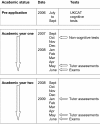Can personal qualities of medical students predict in-course examination success and professional behaviour? An exploratory prospective cohort study
- PMID: 22873571
- PMCID: PMC3473297
- DOI: 10.1186/1472-6920-12-69
Can personal qualities of medical students predict in-course examination success and professional behaviour? An exploratory prospective cohort study
Abstract
Background: Over two-thirds of UK medical schools are augmenting their selection procedures for medical students by using the United Kingdom Clinical Aptitude Test (UKCAT), which employs tests of cognitive and non-cognitive personal qualities, but clear evidence of the tests' predictive validity is lacking. This study explores whether academic performance and professional behaviours that are important in a health professional context can be predicted by these measures, when taken before or very early in the medical course.
Methods: This prospective cohort study follows the progress of the entire student cohort who entered Hull York Medical School in September 2007, having taken the UKCAT cognitive tests in 2006 and the non-cognitive tests a year later. This paper reports on the students' first and second academic years of study. The main outcome measures were regular, repeated tutor assessment of individual students' interpersonal skills and professional behaviour, and annual examination performance in the three domains of recall and application of knowledge, evaluation of data, and communication and practical clinical skills. The relationships between non-cognitive test scores, cognitive test scores, tutor assessments and examination results were explored using the Pearson product-moment correlations for each group of data; the data for students obtaining the top and bottom 20% of the summative examination results were compared using Analysis of Variance.
Results: Personal qualities measured by non-cognitive tests showed a number of statistically significant relationships with ratings of behaviour made by tutors, with performance in each year's objective structured clinical examinations (OSCEs), and with themed written summative examination marks in each year. Cognitive ability scores were also significantly related to each year's examination results, but seldom to professional behaviours. The top 20% of examination achievers could be differentiated from the bottom 20% on both non-cognitive and cognitive measures.
Conclusions: This study shows numerous significant relationships between both cognitive and non-cognitive test scores, academic examination scores and indicators of professional behaviours in medical students. This suggests that measurement of non-cognitive personal qualities in applicants to medical school could make a useful contribution to selection and admission decisions. Further research is required in larger representative groups, and with more refined predictor measures and behavioural assessment methods, to establish beyond doubt the incremental validity of such measures over conventional cognitive assessments.
Figures
References
-
- Price PB, Lewis EG, Loughmiller GC, Nelson DE, Murray MS, Taylor CW. Attributes of a good practicing physician. J Med Educ. 1971;46:229–237. - PubMed
-
- General Medical Council. Tomorrow’s doctors. GMC, London; 2009.
-
- UK Clinical Aptitude Test. http://www.ukcat.ac.uk.
Publication types
MeSH terms
LinkOut - more resources
Full Text Sources



